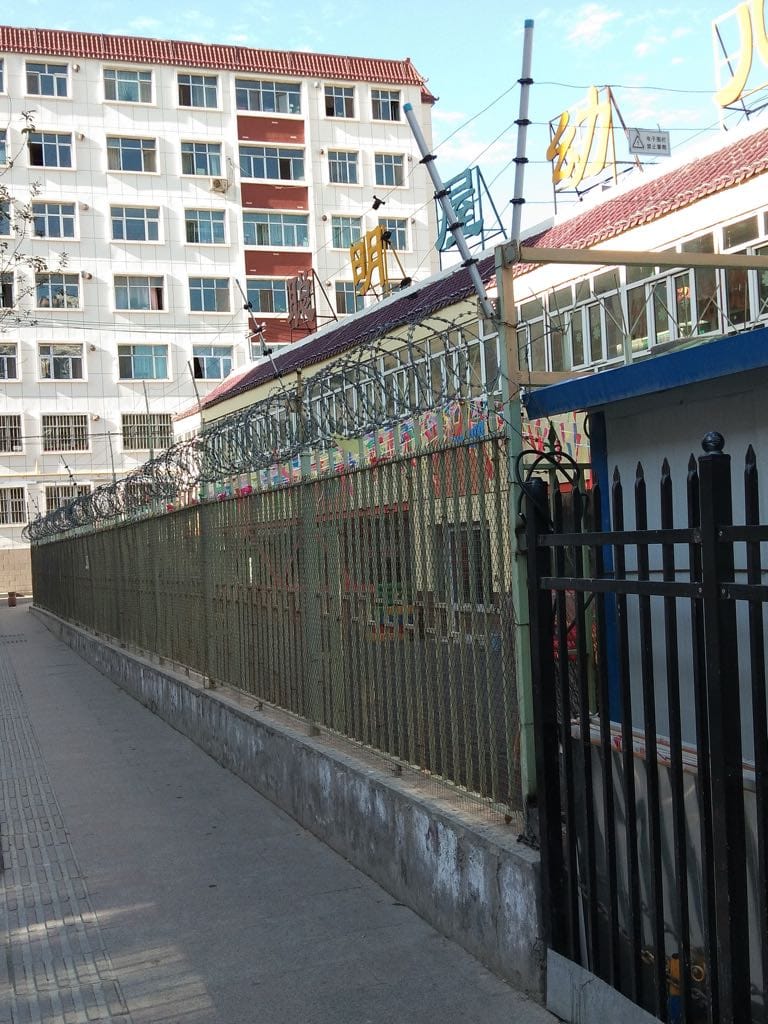China has installed facial recognition software in 6.7 million locations throughout Xinjiang, including mosques and private homes, supporting a brutal repression. The international answer has not been strong enough.
by Robert Clark
Table of Contents
More Camps, More Repression
In what is a further disturbing development in the continued erosion of human rights by the People’s Republic of China (PRC) against the majority Muslim Uyghurs in Xinjiang, the forced indoctrination of Uyghur children, some as young as pre-school age, into the “re-education” camps for political training, is growing at an alarming pace.
Claims of wide-spread human rights abuses occurring in remote Xinjiang province have been developing since 2017, particularly from the international Uyghur diaspora. They center around the PRC’s use of the transformation through education camps. They are camps for “vocational training,” according to United Front Work Department official Hu Lianhe , used for countering Islamist extremism and other such domestic political threats to Chinese sovereignty.
In practice, however, these camps are used by the state as a tool for repression against non-Han Chinese across Xinjiang, which has seen such state policies enacted including the forbiddance of traditional Muslim names for children, the banning of fasting for government officials during Ramadan (despite Muslim Hui officials allowed this practice), the removal of Muslim veils for women in public, and the banning of beards for Muslim men.
New evidence from independent Xinjiang researcher Adrian Zenz has now documented the full extent of these latest developments. Uyghur children are being taken to these camps, under a pretence of pre-school or kindergarten, and are being forced to learn Mandarin Chinese, in addition to official accounts of Chinese history and culture, whilst having to abandon their Uyghur cultural practices, including speaking the language and renouncing Islam. This is all seen as an attempt by Beijing to eradicate the Uyghur cultural identity by targeting the youth generations, in what Dr Zenz describes as “cultural genocide.”


High-Tech Surveillance
Uyghurs lucky enough not to find themselves subjected to the camps increasingly have to abide by China’s rapidly developing surveillance capabilities across Xinjiang. With at least 6.7 million locations, including mosques and homes, fitted with facial recognition software, in effect over 2.5 million people across the province are tracked daily. In addition to this, last year Xinjiang residents were reportedly ordered to download an app that scans for specific content, in an attempt by the government to crack down even further on political freedoms.
In a final move against human rights and personal liberty, according to a report last year by Human Rights Watch many Uyghur families had QR codes fixed to their homes, in order for police to scan them for the family’s details. According to locals living in Xinjiang, this practice has been occurring since 2017. What started out as counter-extremism and counter-terrorism practices against a handful of Uyghur militants fifteen years ago, has now become whole-sale repression, forced incarceration and abject human rights abuses against an entire ethnicity.
Combined with the mass-surveillance policies which rely largely on artificial intelligence (AI) and big data, in addition to the continuing practice of extra-judicial incarcerations and executions, the PRC in Xinjiang has become a totalitarian police state, the likes of which the world has not seen.
Chinese Investments in Domestic Security
Curiously, there are two significant factors in explaining how such practices can be sustained; the first, increased state-level investment into the domestic Chinese security market. If this is rather unsurprising, the figures themselves are nonetheless alarming. The second factor in understanding how these security practices continue to go largely totally uninhibited in the face of growing international awareness, is more difficult to comprehend: Western reaction. More specifically, the reactions of Western states, which vary from the at-best political inability to hold China to account, to the at-worst collusion between Western tech firms and the Chinese state.
The first factor, increased Chinese spending on domestic security, is hardly surprising in itself. However, what is deeply concerning is that the level of spending refuted by Chinese state officials as exaggerated, is in fact but a fraction of a more accurate total cost. While China dismissed a quoted figure of US$26 billion in 2016 for internal security spending as “speculative” and “vague,” the full figure was estimated to be closer to US$ 175 billion, six times higher than that which was previously dismissed by Beijing.
The figures for 2017 are even more alarming. When equating in a Purchasing Power Parity (PPP) basis, in addition to the billions of dollars spent on security-related urban management and surveillance technology initiatives, plus lower costs and wages which render Chinese security capabilities much higher per dollar spent, then a truer cost of China’s domestic security spending in 2017 was equivalent to approximately US$349 billion; more than double that of the US’ estimated US$165 billion. Indeed, according to research conducted by Dr Zenz all security-related facility construction in Xinjiang rose by 213% from 2016-17, consistent with spending on prisons doubling in the same period, whilst spending on the formal prosecution of common criminal suspects stagnated.
Ambiguous Western Answers
The behaviour of Western states is twofold. Several prestigious US firms and institutions, including Google-affiliated employees, SenseNets, and the Massachusetts Institute of Technology, have been implicated in collaborative research with Chinese state-controlled firms into AI development, raising fears that US technology is being utilised to indirectly contribute towards the persecution of the Uyghurs. Lured by the promise of Chinese investment, these institutions should nonetheless realise the low levels of due diligence and oversight that these collaborations with China have, given the context of their human rights abuses.
Secondly, there has been up until this month been very little in way of a unified international response to China’s repression of the Uyghurs. There have been occasional remarks or statements from individuals, such as the former US Ambassador to the UN Nikki Hayley, who in October 2018 cited the mass-incarceration of Uyghurs as perhaps the largest internment of people since World War Two. Only this month has a collective body of Western political action heeded one voice in calling for the end of Uyghur persecution.
Twenty-three member states of the UN Human Rights Council (Italy having joined the original 22) called for the immediate end to the arbitrary detentions and related human rights abuses across Xinjiang. Lacking sufficient support to take the issue to the Security Council, it would be rejected anyway in any shape of a resolution by not just China itself, which retains a veto power, but also Russia, who has since supported Beijing in its security practices.
In addition to Russia, 36 other states have praised the Chinese for their handling of the situation in Xinjiang, exalting the preservation of human rights whilst reducing terrorism and extremism in the region. In reality, nothing could be farther from the truth. If anything, the measures may be fuelling some Uyghurs to travel abroad and fight for Islamist terrorist organisations, including in Syria, in retaliation of their abuse.
The Islamic States: Silent, or Supporting China
The abject lack of any Islamic state to denounce the Uyghur’s repression, in addition to many influential Islamic and Asian states openly supporting China, including both Saudi Arabia and Pakistan, points to the very real consideration that many nations must risk crucial Chinese investment in order to speak out against what’s happening. The level of strategic penetration by China into some of these states is complex and vast, rooted in Beijing’s Belt and Road Initiative, providing multi-billion contracts to states for grand infrastructure projects, often with large debt recovery payments attached, which further deepens strategic dependence on Beijing.
The threatening tone which China uses can be evidenced from March this year. Whilst conducting the Universal Periodic Review, China sought to suppress critical scrutiny of its rights abuses and manipulate the review by providing blatantly false answers on critical issues including freedom of expression and the rule of law. Furthermore, Beijing threatened delegations “in the interest of our bilateral relations” not to attend a panel on human rights in Xinjiang.
What Can Be Done
As China increasingly seeks ways to destabilise the international order, an order built on such notions as freedom from political oppression, freedom of expression, and the right to life and liberty, the international community must seek to challenge the ways in which China continually breeches these principles for over ten million of its own citizens. Offering alternative, more sustainable infrastructure developments to states in the region, such as the Indian deal to invest US$ 8 billion into the Chabahar Port in Iran, is one way to reduce certain states’ vulnerabilities to Chinese political pressure, whilst simultaneously allowing more diplomatic freedom in advocating for improved human rights.
In addition, increased awareness of the Uyghur crisis must be spread throughout the Western hemisphere, aided by an increase in media coverage of the vital work NGOs are conducting. This month the Ministerial to Advance Religious Freedom hosted the largest religious liberty gathering in the world. Attended by representatives from over 100 governments and 500 NGOs, the event, opened and concluded by US Secretary of State Mike Pompeo, aimed inter alia at increasing pressure on the Western tech firms supplying both research and component parts to the repressive Chinese surveillance systems by highlighting their connections to Beijing.
Across Western capitals, more work is needed in highlighting the abuses in Xinjiang. Whilst UK diplomats visited the region in August 2018, and Foreign Secretary Jeremy Hunt subsequently largely agreed with the general consensus of wide-spread human rights abuses, there has been very little broader discussion, particularly amongst academia and the think-tank world, into potential UK policy outcomes. The Henry Jackson Society sought to change that with a discussion in the Houses of Parliament in January 2019, with a dialogue involving Uyghur survivors and UK policy makers, and concluded that it was indeed China’s immense economic leverage which had vastly curtailed both international and Islamic media coverage on the situation in Xinjiang. Increased public debate in London, Washington DC and other global capitals, in addition to wider media coverage of events, will potentially expedite much quicker international condemnation, and hopefully lead to a reversal of fortune for the Uyghur population.
Individually, as is witnessed, states may feel powerless to act. But collectively, the voice of unity should continue to be extolled, and in greater numbers, so as to not allow the repression in Xinjiang to be a failed test of the collective international community to act as one, against one of the greatest moral injustices of our time.









